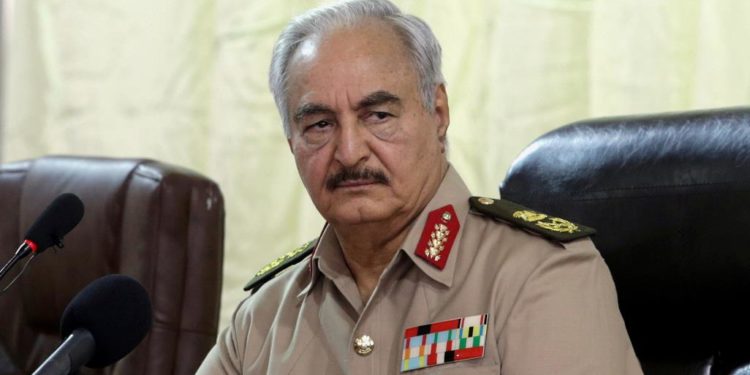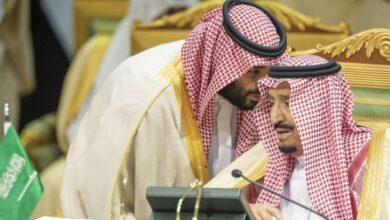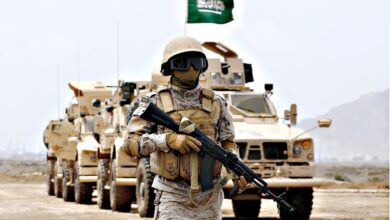Saudi’s plot in Libya… financing Russian mercenaries to support Haftar

A French investigation exposed the scale of the plot of the Saudi regime in Libya by funding Russian mercenaries to fight in the ranks of the militias of retired Major General Khalifa Haftar in his war against the national reconciliation government in the country.
The investigation, published by the French newspaper “Le Monde”, said that the Saudi regime was involved in financing the operations of the Russian Wagner mercenaries who are fighting alongside Haftar militias in Libya to spread chaos and sabotage in the country.
The investigation stated that Haftar’s support was nothing more than a negotiating pressure tool used by Russia to establish its presence in Libya as a major player.
She pointed out that a UN report revealed that foreign fighters led sixty accurate air strikes, out of 170 launched by Hafar’s fighters on
The capital, Tripoli. Le Monde quoted experts as saying that these fighters were from Egypt and the UAE.
It is believed that the intervention of Saudi in Libya comes within the directions of its allies in the Emirates and Egypt and has a close relationship with the gas conflict in the Eastern Mediterranean region.
Previously, the UAE and Egypt were accused of financing Russian “Wagner” mercenaries, in addition to financing and arming mercenaries from several countries fighting alongside Haftar, seeking to overthrow the internationally recognized national “reconciliation” government.
The “Wagner” group is the most famous Russian security company, similar to the American company “Blackwater”, and it operates under its banner hundreds of Russian mercenaries, and is responsible – according to press reports – the implementation of what is described as “dirty” operations in various conflict areas.
The presence of mercenaries from Russian forces destabilizes Libya and raises the possibility of a large number of civilian casualties.
The Government of National Accord confirmed last month that it had documented the presence of between 600 and 800 Russian fighters in Libya, and said it was collecting their names and other evidence of their participation in the fighting to confront the Russian government, while Moscow denies the presence of any forces belonging to Libya.
The Accord government, which is internationally recognized in Libya, accuses the Saudi, the Emirates, and Egypt of being involved in carrying out military operations in Libyan territory in support of the attempted Haftar coup and control of the capital, Tripoli.
The Saudi regime bears a large part of the responsibility for the war crimes and violations committed against civilians in Libya against the backdrop of the Kingdom’s hidden support for Haftar.
On March 27, 2019, Major General Haftar visited the Kingdom, where he was received by King Salman bin Abdulaziz and his Crown Prince Mohammed bin Salman, and also held discussions with the Minister of Interior and the head of the General Intelligence Service.
The visit came, as it turned out later, ahead of a major military operation that Haftar was preparing to attack the capital, Tripoli, and thus control the western region and dominate the Libyan state, as planned.
The American Wall Street Journal – in its April 12, 2019 issue – indicated that Riyadh had promised Haftar tens of millions of dollars to help pay for the military operation he launched in Tripoli on April 4.
The newspaper quoted a prominent Saudi official – whom he did not name – as saying, “We were generous with him,” referring to the retired Libyan general receiving generous financial support from the Kingdom to accomplish his military mission in Libya.
In addition to financial assistance, Haftar was aspiring, during that visit, for Saudi to intervene in Washington to persuade the later of his campaign against Tripoli, and also to use its influence over some Arab countries to reassure.
Haftar returned to Libya after receiving the necessary financial support and reassurances, and he got the green light to start the attack on Tripoli and implement what he saw as the last part of his military and political project.
Years ago, Riyadh had virtually joined the UAE and Egypt in adopting the Haftar project in Libya. In August 2017, it arrested three leaders affiliated with the Tripoli government while performing Umrah, and handed them over to the eastern Libyan authorities loyal to Haftar in response to a request from the UAE.
This Saudi alignment came to Haftar’s side, considering that the Kingdom is part of this alliance that opposes popular revolutions in the region and supports the military’s control of the government, as it is an extension of the alliance of the Salafi-input movement with a Wahhabi background in Libya with the retired Major General and fighting alongside him.
When Haftar launched in 2014 what was known as Battle of Benghazi, the Saudi Salafi Sheikh Rabie Al-Madkhali advised his followers in Libya to fight within Haftar’s forces, as he is a “legal guardian” authorized by the “guardian” (the parliament in Tobruk) and hundreds of these joined. The current for fighting in the ranks of the Haftar forces in the battles of Benghazi, Derna and others, within what is known as the “Tawheed Brigades”.
In addition to the hundreds of fighters distributed on the fighting axes, Haftar allowed the penetration of the followers of the current movement in most of the agencies and departments in its areas of control in eastern Libya, especially the Ministry of Awqaf and Dar al-Ifta, and thus controlled the mosques and platforms.
Since the start of his military campaign called Battle of Benghazi in May 2014, there has been evidence of Haftar obtaining weapons from the UAE, Egypt and other countries despite the UN embargo as well as financial support from the Saudi regime.





